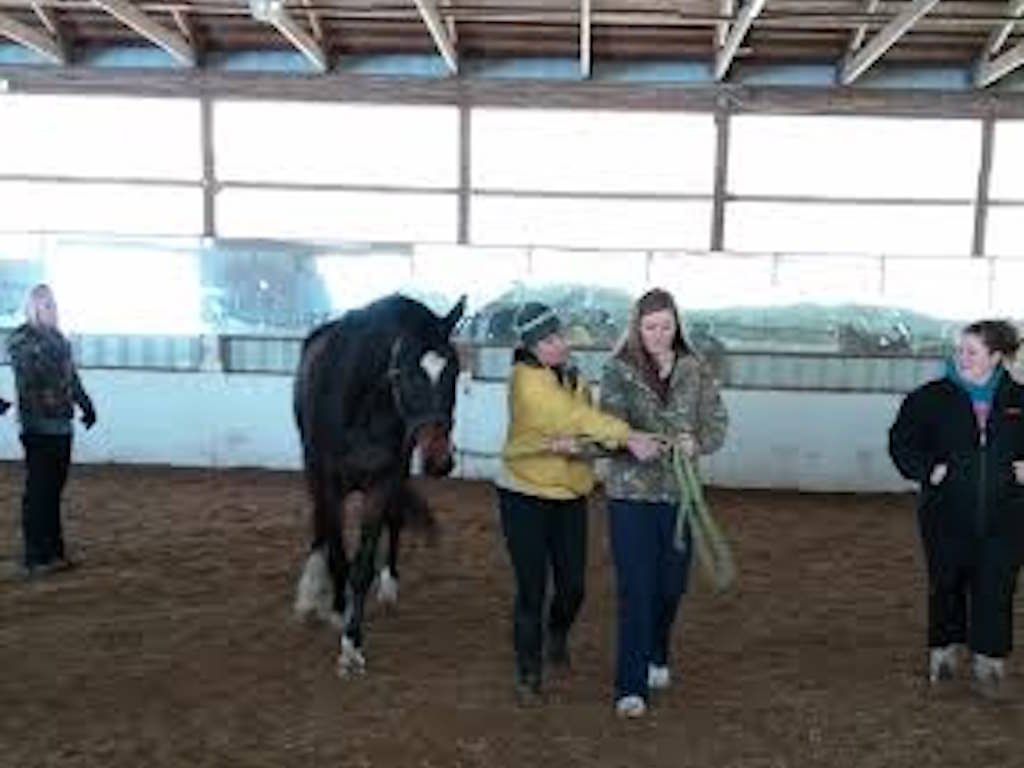 Like all other programs, Ross Medical Education Center’s Veterinary Assistant training program is broken up into modules. In module two of this program, students are given instruction on restraint and handling on a variety of animal species. Throughout the modules, the Ross Veterinary Assistant program in New Baltimore, Michigan has had an incredible resource in local Goodells Farm in Goodells, Michigan. They have given Ross students many opportunities to get hands-on experience with horse restraint. Although during their most recent trip the weather did not cooperate well, the students were still very excited to get out of the classroom and into the barn to work with the animals!
Like all other programs, Ross Medical Education Center’s Veterinary Assistant training program is broken up into modules. In module two of this program, students are given instruction on restraint and handling on a variety of animal species. Throughout the modules, the Ross Veterinary Assistant program in New Baltimore, Michigan has had an incredible resource in local Goodells Farm in Goodells, Michigan. They have given Ross students many opportunities to get hands-on experience with horse restraint. Although during their most recent trip the weather did not cooperate well, the students were still very excited to get out of the classroom and into the barn to work with the animals!
 During their time at the farm, students were able to learn the importance of safety when working with horses. They were very carefully supervised by Trainer Zoe as they were instructed on how to properly lead a horse. They also were shown the proper way to place a halter on the head. Other restraint techniques that may be used on horses were demonstrated for the students, and each student had the chance to lift and clean the hooves of the very patient horse, Woodrow. Zoe went on to give the students examples of normal and abnormal horse behavior. She then went through a short history on the domestication of the animal.
During their time at the farm, students were able to learn the importance of safety when working with horses. They were very carefully supervised by Trainer Zoe as they were instructed on how to properly lead a horse. They also were shown the proper way to place a halter on the head. Other restraint techniques that may be used on horses were demonstrated for the students, and each student had the chance to lift and clean the hooves of the very patient horse, Woodrow. Zoe went on to give the students examples of normal and abnormal horse behavior. She then went through a short history on the domestication of the animal.
In the classroom, students are only able to practice on smaller animals like dogs and cats, so this trip is invaluable for the Veterinary Assistant students. Even the students that were apprehensive about horses were much more confident after visiting the farm. Part of the reason is that Trainer Zoe will spend extra time with them to make sure that they understand the basics and safety involved in handling these animals.
 To further their education in the restraint and handling portion of module two, Spencer, the Office Manager from Riverview Veterinary Hospital in St. Clair, Michigan also came by for a visit. He demonstrated some basic behavior and restraint procedures on rabbits and chinchillas. He has previously bred and shown rabbits, so he was able to bring a wealth of knowledge about the different breeds and some of the handling and behavioral issues that may be important. Chinchillas also require specific housing and handling techniques, and Spencer was able to show the students appropriate housing and provide them with detailed lessons on how to handle them.
To further their education in the restraint and handling portion of module two, Spencer, the Office Manager from Riverview Veterinary Hospital in St. Clair, Michigan also came by for a visit. He demonstrated some basic behavior and restraint procedures on rabbits and chinchillas. He has previously bred and shown rabbits, so he was able to bring a wealth of knowledge about the different breeds and some of the handling and behavioral issues that may be important. Chinchillas also require specific housing and handling techniques, and Spencer was able to show the students appropriate housing and provide them with detailed lessons on how to handle them.
 After some demonstration, the students were able to trim nails, give eye medication, and even watch the chinchilla take a little dust bath, which is a very important part of the care of these little animals. “Having volunteers to come into our Veterinary Assistant classroom is vital to giving our students a well-rounded experience of all different types of species seen in the veterinary hospital,” shared Jennifer Maniaci, New Baltimore Campus Director. The campus is so appreciative for all the local resources and individuals that work hard to promote education in their community.
After some demonstration, the students were able to trim nails, give eye medication, and even watch the chinchilla take a little dust bath, which is a very important part of the care of these little animals. “Having volunteers to come into our Veterinary Assistant classroom is vital to giving our students a well-rounded experience of all different types of species seen in the veterinary hospital,” shared Jennifer Maniaci, New Baltimore Campus Director. The campus is so appreciative for all the local resources and individuals that work hard to promote education in their community.
